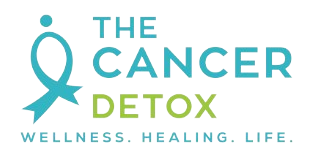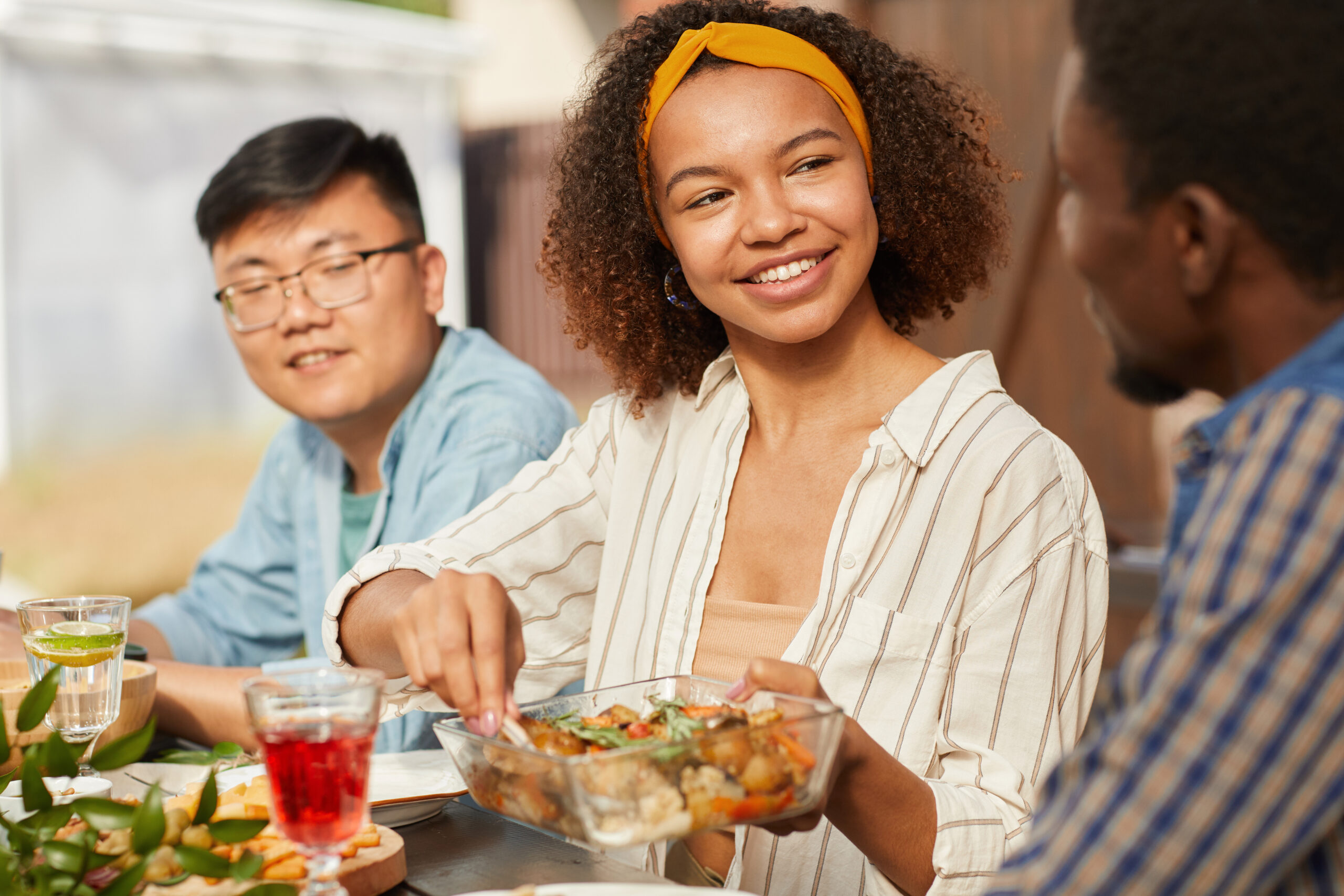
10 Foods That Prevent Cancer
10 FOODS THAT PREVENT CANCER
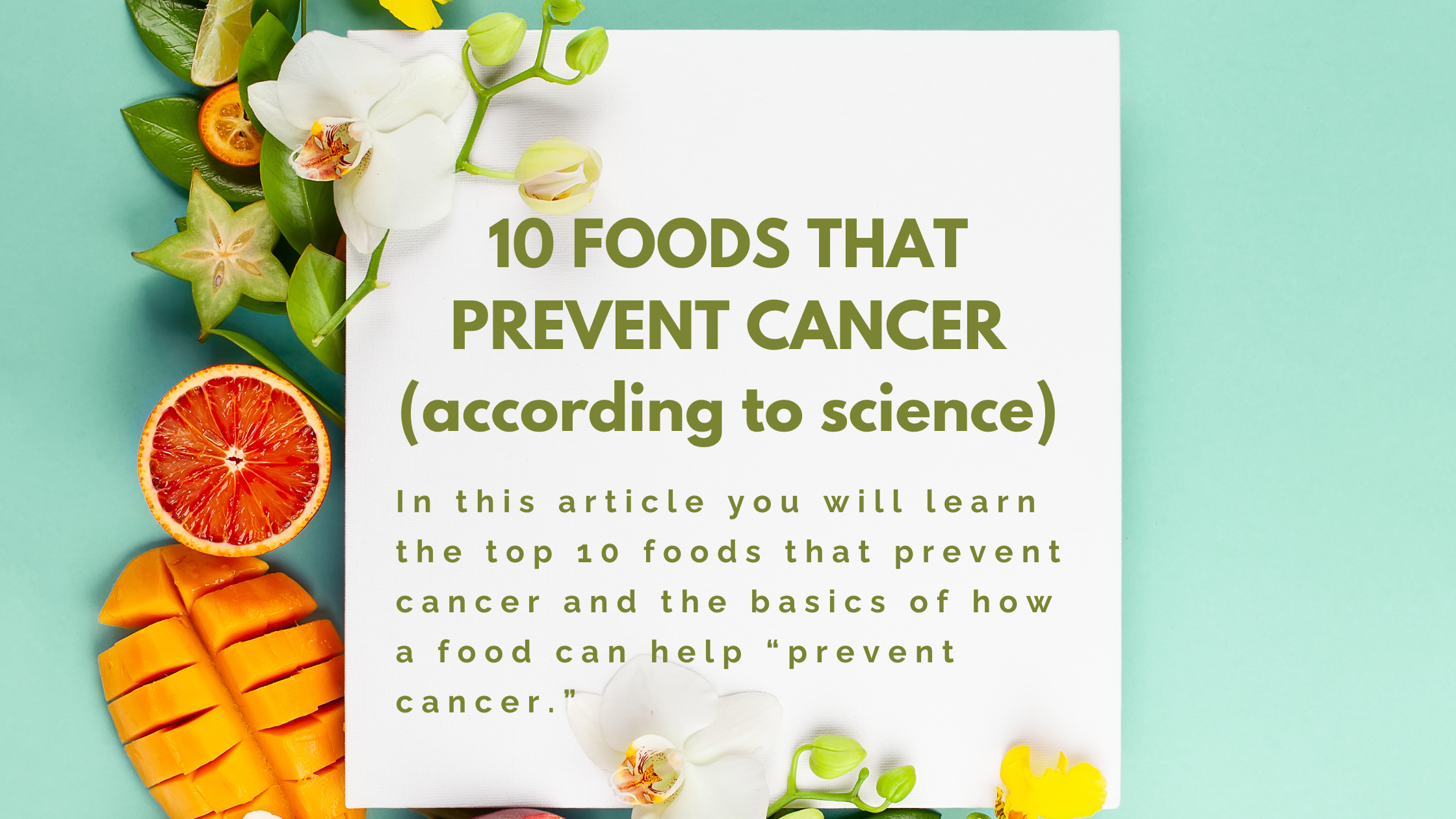
10 Foods that prevent cancer
INTRODUCTION
It is estimated that 30 – 50% of all cancer cases are preventable.[1] And if you look at the data, only 5 – 10% of cancers are due to one’s genetics (i.e., inheriting genes that cause cancer). [1] The following 10 foods that prevent cancer will help those with a family history of cancer and want to decrease their risk of this disease, or cancer survivors who wish to prevent a cancer recurrence.
And if you need more foods that prevent cancer, here are some important resources we’ve curated for you!
- COLON CANCER PREVENTION: FREE download of the Colon Cancer Bundle here: 4 Tips on Preventing a Colon Cancer Recurrence (including cancer fighting foods) + 9 Questions to Ask Your Doctor
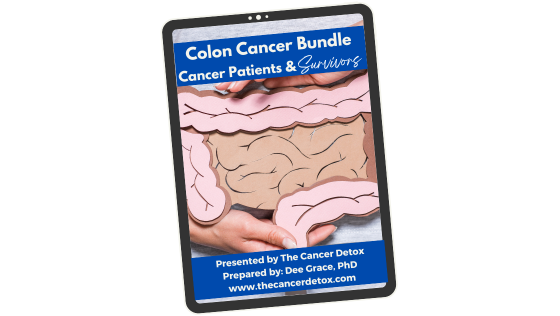
Colon cancer prevention guide
2. BREAST CANCER PREVENTION: Learn about the best foods that prevent breast cancer here + 3 days of plant-based recipes
3. EAT MORE FRUITS AND VEGETABLES: Need help getting your 5 servings of fruits and vegetables a day? Download the 5-day cancer-fighting smoothies challenge here!
10 FOODS THAT HELP PREVENT CANCER
#1 LEAFY GREEN VEGETABLES
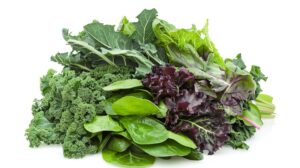
Leafy green vegetables prevent cancer
Leafy green vegetables are cancer-fighting foods and include kale (both curly kale and lacinato, or dinosaur kale), spinach, green lettuces (e.g., romaine, butter, Boston lettuces, etc.), collard greens, and mustard greens, to name a few. These vegetables provide the following benefits:
- Protects DNA from damage: Healthy DNA is essential to preventing cancer. Any damage to the cell’s DNA and resulting genetic mutations can lead to cancer development. DNA damage can result in a cell becoming “rogue,” which means it grows uncontrollably. This is one of the hallmarks of cancer growth and development. Leafy green vegetables provides essential nutrients and phytochemicals that protect DNA from damage.
- Provides vitamins, minerals, and phytochemicals: Vitamins and minerals are essential for normal body functioning. Leafy green vegetables contain minerals such as calcium, potassium, and iron, and vitamin A, B, and C. They also contain phytochemicals, an important component for lowering chronic inflammation (a detailed explanation of inflammation here) in the body and providing antioxidants that help reduce DNA and cellular damage. [3]
- Dietary fiber: An anti-cancer diet is one that includes high dietary fiber (see how much to eat to prevent breast and colon cancers). Fiber appears to reduce the risk by reducing the amount of time feces remains in the colon (hence, less toxins reabsorbed back into the body) and maintains a healthy microbiome.
Eating 100 grams/day of leafy green vegetables, which is just over 1 serving (80 grams or 3 ounces) has been shown to lower the risk of all types of cancer by 9%. [2]
#2 CRUCIFEROUS VEGETABLES
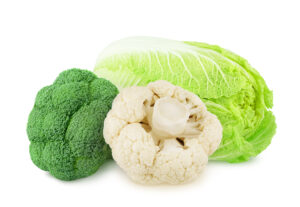
Cruciferous vegetables prevent cancer
When it comes to foods that fight cancer, cruciferous vegetables are at the top of the list. They include some leafy green vegetables (bok choy, Brussel sprouts, green cabbage, kale, Napa cabbage, watercress) and traditional vegetables such as broccoli, cauliflower, and turnips. They provide the following benefits:
- Antioxidants: These vegetables contain the antioxidants catalase and superoxide dismutase, which help protect the body’s cells and tissues from damage. Particularly protecting the cell’s DNA in order to reduce the amount of possible DNA mutations.
- Polyphenols: these are compounds work as antioxidants, anti-inflammatory agents as well as other beneficial ways to protect the health of the cells. They include flavonoids and hydroxycinnamic acids
- Sulfur compounds – Isothiocyanates: Cruciferous vegetables are considered cancer fighting foods because of these compounds. One type of isothiocyanate is sulphorophane. It is known as a chemopreventive agent (i.e., cancer fighting agent) because it has been shown to prevent cancer in laboratory experiments and human studies. It helps to promote apoptosis (spontaneous cell death), regulate the growth of cells, reduce the growth of new blood vessels to growing tumors (known as angiogenesis), and detoxify the body of environmental chemicals
Eating a high amount of cruciferous vegetables has been shown to reduce the risk of all types of cancers by 16% compared to eating a low amount of these vegetables. [3]
#3 APPLES AND PEARS
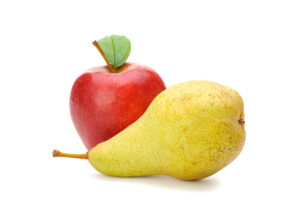
Apples and pears prevent cancer
These two fruits are staples in most kitchen pantries during the fall, with apples being enjoyed year-round. A recent meta-analysis examined multiple scientific studies to determine the cancer fighting potential of these two fruits. They found that eating a high amount of both lowered cancer risk by 20%. [1]
#4 BERRIES
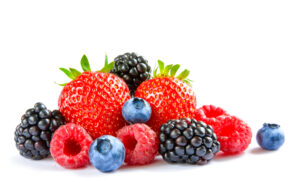
Berries prevent cancer
Berries, including blueberries, raspberries, and blackberries, can reduce the risk of cancer by 8% according to the latest research. [2] Their preventive effect is due to the phytochemical known as flavonoids, which as previously mentioned is anti-inflammatory. You may have also heard that berries help improve heart health, again due to flavonoids that improve blood vessel function.
#5 CITRUS FRUITS
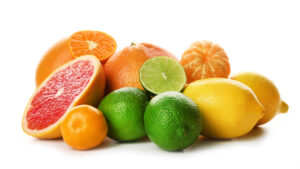
Citrus fruits prevent cancer
This includes oranges, grapefruits and lemons. The reduction in the risk of all types of cancer is 10%. [2] Flavanoids are the reason why, particularly a subclass known as flavanones and flavonols.
#6 TOMATOES
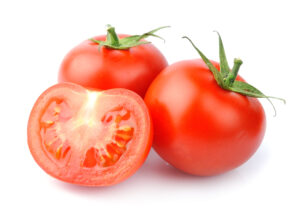
Tomatoes prevent cancer
Tomatoes, which contain a high amount of a beneficial red pigment known as lycopene, have been shown to reduce the risk of prostate, cervical, kidney, and some head and neck cancers. [5] Lycopene is a “bioactive” pigment, meaning it has properties that are beneficial in cancer prevention, similar to flavonoids.
Eating tomatoes has been shown to reduce the risk of all cancers by 14%. [2]
#7 ONIONS
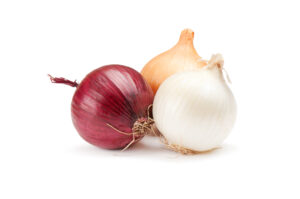
Onions prevent cancer
Eating a healthy dose of onions on salads and other dishes can prevent cancer by 9% when eaten at high amounts. [2] Onions have also shown benefits in reducing the risk of breast cancer in Hispanic women who ate high amounts of a seasoning known as sofrito, which contains not only onions but garlic and other cancer-fighting herbs. [6]
This cancer-fighting food helps prevent cancer due to high concentrations of a flavonoid known as quercetin. They also contain another flavonoid known as anthocyanin, which boosts the cancer-fighting properties of quercetin. [7]
#8 BANANAS
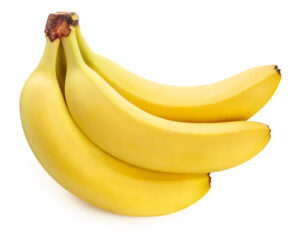
Bananas prevent cancer
Recent science shows that eating bananas before they get too ripe can help prevent cancer. Slightly green bananas contain a high amount of resistant starch, which gut bacteria use to make beneficial fermented by-products. These by-products protect the body from cancer development.
Researchers found that taking a resistant starch supplement, at the same concentration found in bananas, reduced the risk of cancer by 60% in a group of people genetically predisposed to cancer (i.e., those with Lynch syndrome). [8]
#9 YELLOW VEGETABLES
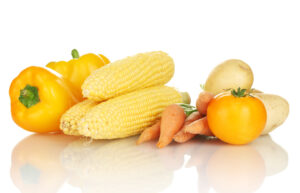
Yellow vegetables prevent cancer
Our top 10 list of cancer-fighting foods included green vegetables in the #1 and #2 spots; however, do other vegetables help lower cancer risk? Yes. When green and yellow vegetables are eaten (at an amount of 100 grams per day) the risk of cancer is lowered by 11%. [2]
#10 SPROUTS
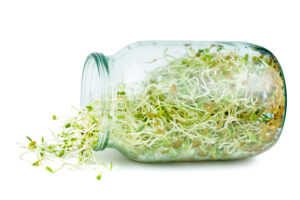
Sprouts prevent cancer
Often used as a garnish on salads and gourmet dishes, this small but mighty food is known as a cancer-fighting foods. High in protein, antioxidants, vitamins, and minerals, they have been found to have 10 – 100 times more of the cancer-fighting chemicals than mature unsprouted vegetables (specifically for broccoli sprouts). Sprouts increase a specific cellular protein, Nrf2, that is responsible for detoxifying chemicals in the body.
Here’s To Your Best Health!
Dee Grace, PhD

Hi! I am Dee Grace Ph.D., Scientist and Chief Prevention Officer here at The Cancer Detox. I have over 7 years of experience in cancer research. The Cancer Detox knows that cancer rates are dramatically increasing, so we help Cancer Preventers implement strategies focused on dietary and lifestyle habits. We also help Cancer Patients & Survivors advocate for their health and wellness during their treatment journey.
REFERENCES:
[1] Wang X, et al. Fruit and vegetable consumption and mortality from all causes, cardiovascular disease, and cancer: systematic review and dose response meta analysis of prospective cohort studies. BMJ. 2014;29:349. [2] Aune D, et al. Fruit and vegetable intake and the risk of cardiovascular disease, total cancer and all cause mortality – a systemic review and dose response meta analysis of prospective studies. Int J Epidemion. 2017 Jun; 46(3): 1029–1056. [3] Sarkar T, et al. Underutilized green leafy vegetables: frontier in fortified food development and nutrition. Crit Rev Food Sci Nutr. 2023;63:11679. [4] Su X, et al. Anticancer activity of sulforophane: the epigenetic mechanisms and the Nrf2 signaling pathway. Oxidative Med Cell Longevity. 2018. [5] Ho WJ, et al. Antioxidant micronutrients and the risk of renal cell carcinoma in the Women’s Health Initiative cohort. Cancer. 2015; 121 (4): 580. [6] Desai G, et al. Onion and Garlic Intake and Breast Cancer, a Case-Control Study in Puerto Rico. Nutr Cancer. 2019; 1 DOI: 10.1080/01635581.2019.1651349 [7] Murayyan AI, et al. Antiproliferative activity of Ontario grown onions against colorectal adenocarcinoma cells. Food Res Inter. 2017; 96: 12 DOI: 10.1016/j.foodres.2017.03.017 [8] Mathers JC, et al. Cancer Prevention with Resistant Starch in Lynch Syndrome Patients in the CAPP2-Randomized Placebo Controlled Trial: Planned 10-Year Follow-up. Cancer Prev Res. 2022; OF1 DOI: 10.1158/1940-6207.CAPR-22-0044

